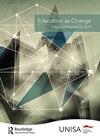Epistemic Journeying across Abyssal Lines of Thinking: Towards Reclaiming Southern Voices
IF 1
4区 教育学
Q3 EDUCATION & EDUCATIONAL RESEARCH
引用次数: 0
Abstract
Cognitive injustice, which nourishes and sustains current political, social and economic injustice, has been at the centre of the knowledge production enterprise since the colonisers embarked on their project of dispossession and plunder. In order to achieve global justice, the quest for epistemic justice needs to be brought to the centre of curriculum discourses. The postcolonial critique of the canonical corpus of Euro-Western knowledge demands a change in our locus of enunciation. We seized this zeitgeist to repaint the education curriculum canvass in science professional teacher development. We leveraged theoretical constructs from Southern theory, by adopting a decolonial epistemic perspective and privileging a dialogic dynamic. Six purposefully selected, practising science teachers, who were registered to study an Honours in Education module, were engaged to generate qualitative data to respond to the following question: How do science teachers leverage indigenous knowledge to address sustainable development goals? Teachers engaged in intercultural dialogue with indigenous knowledge holders to tap into a plurality of different knowledges. The indigenous knowledge holders who participated were interested in sustainable production/cultivation of items they had used in their practice. Teachers developed portfolios of evidence and participated in focus group interviews. They experienced moments of mourning, dreaming, rediscovery and recovery. This resonated with the same categories that were previously identified by Chilisa, as teachers deconstructed and reconstructed curriculum materials collaboratively with indigenous knowledge holders. The findings reveal that the teachers viewed an indigenous understanding of the world as crucial in the achievement of sustainable development goals. The monolithic, hegemonic Euro-Western thinking was decentred but not abandoned. Instead, teachers rendered it one part of the intercultural dialogue. The study demonstrated the potential for transforming the curriculum to become inclusive of Southern voices in the production of valuable, truthful, reliable knowledge about living together sustainably.跨越深渊思维的认识之旅:走向南方之声的复兴
自殖民者开始他们的剥夺和掠夺项目以来,助长和维持当前政治、社会和经济不公正的认知不公正一直是知识生产企业的核心。为了实现全球正义,对认识正义的追求需要成为课程话语的中心。对欧洲-西方知识规范语料库的后殖民批判要求我们改变表达的位置。我们抓住这一时代精神,重新审视了科学专业教师发展中的教育课程游说。我们利用了南方理论的理论建构,采用了非殖民化的认识视角,并赋予了对话的动力。有目的地挑选了六名注册学习教育荣誉模块的实习科学教师,他们参与生成定性数据,以回答以下问题:科学教师如何利用土著知识来实现可持续发展目标?教师与土著知识持有者进行文化间对话,以挖掘多种不同的知识。参与的土著知识持有者对他们在实践中使用的物品的可持续生产/种植感兴趣。教师们编制了证据档案,并参加了焦点小组访谈。他们经历了哀悼、做梦、重新发现和恢复的时刻。这与Chilisa之前确定的相同类别产生了共鸣,因为教师与土著知识持有者合作解构和重建课程材料。研究结果表明,教师们认为土著人对世界的理解对实现可持续发展目标至关重要。铁板一块的、霸权主义的欧洲-西方思想被削弱了,但并没有被抛弃。相反,老师们把它作为跨文化对话的一部分。这项研究表明,在产生关于可持续生活的有价值、真实、可靠的知识方面,有可能改变课程,使其融入南方的声音。
本文章由计算机程序翻译,如有差异,请以英文原文为准。
求助全文
约1分钟内获得全文
求助全文
来源期刊

Education As Change
EDUCATION & EDUCATIONAL RESEARCH-
CiteScore
1.40
自引率
0.00%
发文量
29
审稿时长
24 weeks
期刊介绍:
Education as Change is an accredited, peer reviewed scholarly online journal that publishes original articles reflecting critically on issues of equality in education and on the ways in which educational practices contribute to transformation in non-formal, formal and informal contexts. Critique, mainly understood in the tradition of critical pedagogies, is a constructive process which contributes towards a better world. Contributions from and about marginalised communities and from different knowledge traditions are encouraged. The articles could draw on any rigorous research methodology, as well as transdisciplinary approaches. Research of a very specialised or technical nature should be framed within relevant discourses. While specialised kinds of research are encouraged, authors are expected to write for a broader audience of educational researchers and practitioners without losing conceptual and theoretical depth and rigour. All sectors of education are covered in the journal. These include primary, secondary and tertiary education, adult education, worker education, educational policy and teacher education.
 求助内容:
求助内容: 应助结果提醒方式:
应助结果提醒方式:


